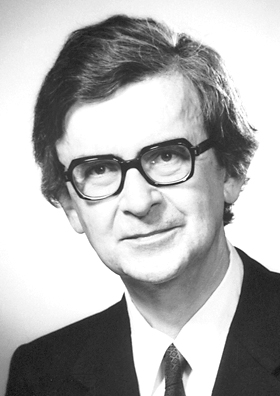<Back to Index>
- Immunologist Niels Kaj Jerne, 1911
- Illustrator Pierre Brissaud, 1885
- Prime Minister of Belgium Hubert Marie Eugène, Comte Pierlot, 1883
PAGE SPONSOR

Niels Kaj Jerne, FRS (December 23, 1911 – October 7, 1994) was a Danish immunologist. He was awarded the Nobel Prize in Physiology or Medicine in 1984. The citation read "For theories concerning the specificity in development and control of the immune system and the discovery of the principle for production of monoclonal antibodies". He shared the prize with Georges J.F. Köhler and César Milstein.
His ancestors had lived on the small Danish island of Fanø for centuries, but in 1910 his parents moved to London where Jerne was born in 1911. During the First World War his parents moved to the Netherlands and Jerne spent his youth in Rotterdam. After studying physics for two years at Leiden University, Jerne moved to Copenhagen and changed his studies to the field of medicine. He graduated from the University of Copenhagen with a degree in medicine in 1947, and in 1951 he was awarded the doctorate for a thesis titled "A Study of Avidity Based on Rabbit Skin Responses to Diphteria Toxin - Antitoxin Mixtures".
From 1943 to 1956 Jerne was a research worker at the Danish National Serum Institute and during this time he formulated a theory on antibody formation. It is said that Jerne got his revolutionary scientific idea while bicycling across the Langebro bridge in Copenhagen on his way home from work. The antibody formation theory gave Jerne international recognition and in 1956 Jerne went to work for the World Health Organization in Geneva, where he served as the Head of the Sections of Biological Standards and of Immunology. He held this post for six years until moving to the United States and the University of Pittsburgh in 1962 to work as Professor of Microbiology and Chairman of the Department of Microbiology for four years. Jerne continued to do work for the World Health Organization as a member of the Expert Advisory Panel of Immunology from 1962 and onwards.
In 1966 Jerne moved back to Europe and took up the position of Professor of Experimental Therapy at the Johann Wolfgang Goethe University in Frankfurt. From 1966 to 1969 he was the Director of the Paul - Ehrlich - Institut, also in Frankfurt. In 1969 Jerne again switched jobs, this time to Basel in Switzerland, where he was the Director of the Basel Institute for Immunology until his retirement in 1980. During the 1970s and 1980s Jerne was a pioneer in the development of immune network theory.
Jerne was married three times. He had two sons, Ivar Jerne (born 1936) and Donald Jerne (born 1941), with Tjek Jerne. Jerne had a third son, Andreas Wettstein, with Gertrud Wettstein, in 1971.